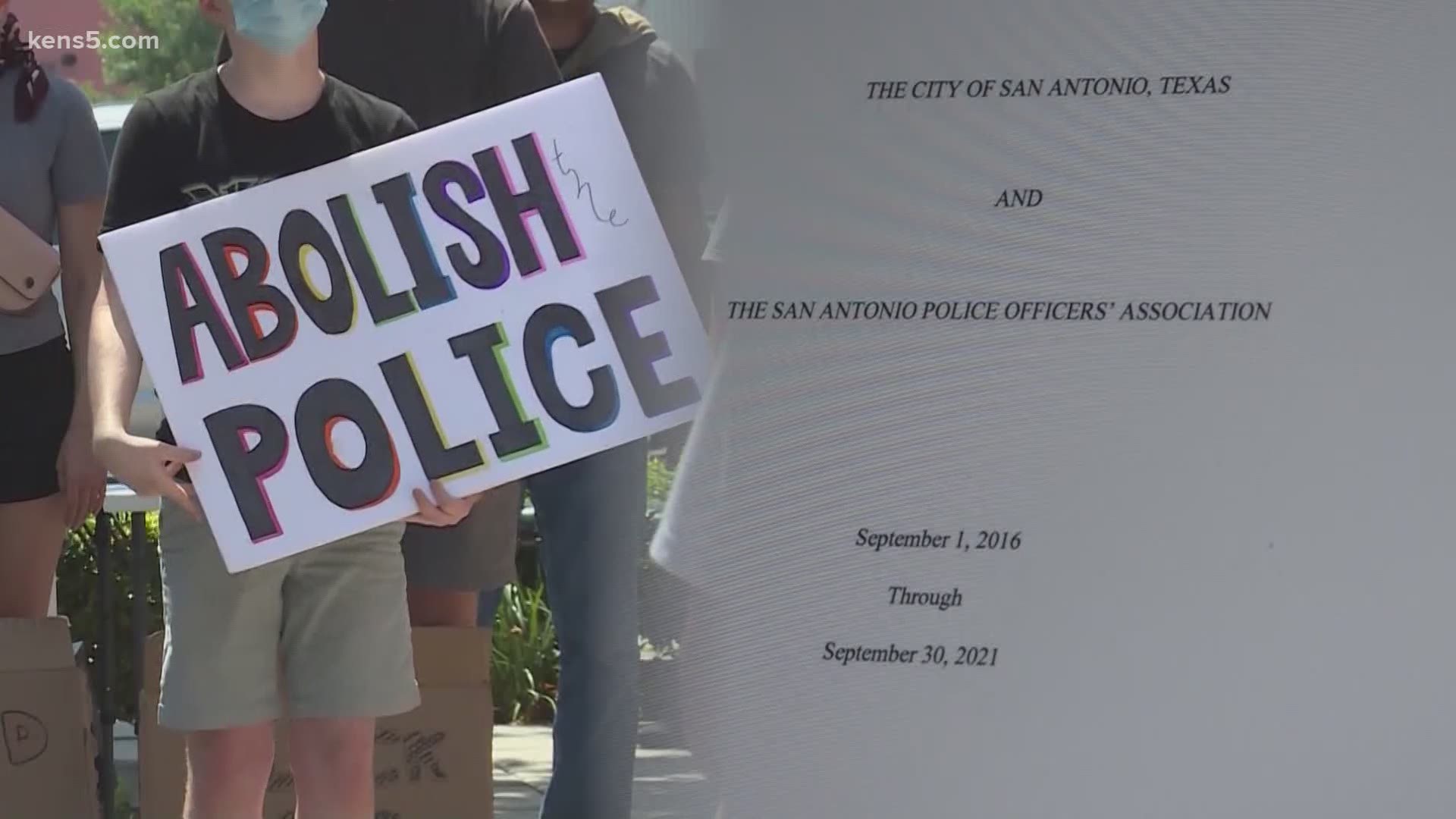SAN ANTONIO — City leaders have stressed the difficulties associated with getting rid of bad cops, but San Antonio Police Officers Association president Mike Helle said numbers show the labor union has nowhere near as much power as claimed.
"In most cases, the city gets their desired outcome," Helle said.
When an officer is accused of impropriety and terminated by San Antonio Police Chief William McManus, they aren't immediately gone like in most professions. Some officers are able to appeal their firing through a process known as arbitration, in which an independent judge of the circumstances comes in to decide whether the punishment fit the alleged crime, or is within the bounds of the city's negotiated agreement with the SAPOA and state law.
Over the last decade, 24 cases have reached an independent arbiter and of those 24 cases, 10 officers have won back their jobs, putting the city at a 58% rate of success.
Among the 10 who have won back their job are officers like Tim Garcia, who was reinstated to the force last year. McManus terminated Garcia for repeatedly using a racial slur during the 2018 arrest of an African American man.
The hearing examiner opined that Garcia's use of the N-word during the arrest did not make him inherently racist and reduced his firing to a 10-month suspension, or the time he spent fighting for his job.
"I do not think there is convincing evidence that (Garcia) is a racist," arbiter Thomas Cipolla wrote. "One diatribe does not automatically denote a racist."
Other officers reinstated include Matthew Belver, who was recorded challenging an inmate to a fight for his freedom. Belver's suspension was reduced to 45 days in 2016, according to city records.
Belver had already signed a last chance agreement in 2010, which McManus last month described as a final chance given to officers accused of egregious conduct that does not require a termination. McManus tried to fire Belver in 2016, citing the previous last chance agreement, though the arbitrator, Lynn Gomez, wrote, "(McManus) believed the (last chance agreement) would prevent any further misconduct by (Belver). Although that did not occur, (Belver) has another opportunity to salvage his SAPD career.
In those cases, the independent hearing examiner overruled McManus, leaving him no option but to reinstate the officers to the force.
Among the 14 whose firings were upheld by independent arbitrators are the terminations of Justin Ayars and Matthew Luckhurst. Ayars avoided criminal charges, but is alleged to have hit his then-fiancee in the face with a rock, fracturing her orbital socket. Luckhurst's disciplinary actions were far more complex.
Luckhurst was issued two indefinite suspensions stemming from two separate incidents, though both involved feces. In the first incident, Luckhurst is accused of giving a homeless individual a feces sandwich. The arbitrator sided with Luckhurst in that disciplinary matter, stating it occurred more than 180 days from when he was disciplined -- a provision outlined in state law which prevents an agency from disciplining an officer more than 180 days following the incident for which they are being punished. Helle said the 180-day provision does not apply to criminal conduct.
The second indefinite suspension stemmed from an incident in which Luckhurst is alleged to have defecated in the only women's toilet at bike patrol and spreading a brown, feces-like substance on the toilet. An arbitrator -- the same person who reinstated Garcia -- sided with McManus, upholding Luckhurst's firing.
In announcing Luckhurst's official termination, City Manager Erik Walsh noted that "it should never have been this hard to fire him.” Walsh said "the contract provision that gave him more chances than he deserved remains an obstacle to the Chief’s ability to discipline officers who fail to live up to SAPD’s standards.”
McManus, during a discussion on policing in mid-June, said as much, telling members of City Council, "Consequences from misconduct must be served and they must be final. If they're not, we'll get police officers back on the department that need to be fired. State law and collective bargaining contracts protect bad officers."
City Council in 2016 passed the current collective bargaining agreement in an 8-2 vote. Mayor Ron Nirenberg and former city councilman Rey Saldana opposed the agreement, while current council members Rebecca Viagran, Roberto Trevino and Shirley Gonzales then voted in favor of the contract.
Gonzales, Trevino and Viagran are now calling for reform to the contract as it expires in September 2021.
Helle on Wednesday countered McManus, noting that over the last decade, McManus has brought back 20 officers which he himself had initially fired.
"(McManus) shouldn’t have come out and said, ‘Oh, I can’t fire bad cops,’ adding some hysteria to make it seem like everything was upside down, that his arms are behind his back, which is completely false," Helle said. "He has absolute authority to fire anybody he wants to for any infraction in the police department."
But the arbitration process can take several months -- sometimes years. And if an arbitrator decides to go against McManus' decision, the city, in some cases, stands to lose tens of thousands of dollars in back pay and benefits for the time which the officer spent fighting their termination.
It's ultimately a process Helle said the union stands behind.
"(The arbiter) should not be part of the mob," Helle said. "He needs to be independent. He needs to be the jurist that didn't read the paper about this heinous crime ... The jury needs to be independent and not have any bias coming into the situation."
The City of San Antonio, Mayor's office and San Antonio Police Department did not respond to requests for comment as of this publication.

